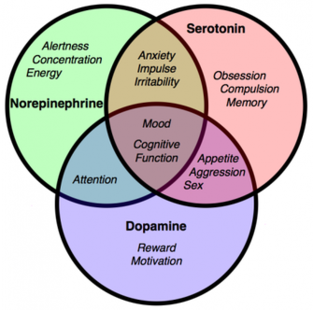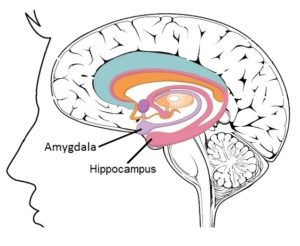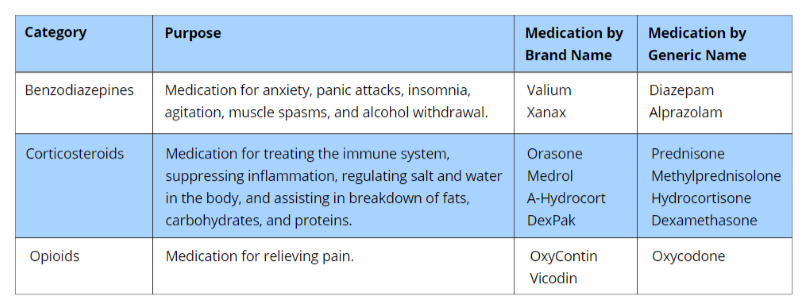Causes of Depression
A variety of factors come together to cause depression. Even today, it isn’t fully known what exactly causes depression for a particular person. (1) Here, you will learn how an individual’s genes and biology factor into depression. You will also learn about environmental causes of depression, which are situations and events a person encounters in life that can lead to depression. (1)

Genetic Causes
Depression can run in families, which suggests a genetic link to depression. (2) In fact, people with a parent or sibling that have had depression are up to three times more likely to develop the illness than those who don’t have a close relative with depression. (1)
The study of identical twins has also shown a genetic link to depression. Researchers have found that when one identical twin becomes depressed, the other also develops clinical depression about 67% of the time even when they are raised apart from each other. (1)
Researchers have also identified genes in “genetically vulnerable” people that make them more susceptible to low moods and depression when subjected to stress. (3) For example, for people who are under the same amount of stress, those who are genetically prone to depression are much more likely to become depressed than those who aren’t genetically prone.
Biological Causes
Neurotransmitters
In depressed people, there’s an imbalance in neurotransmitters — the chemical messengers brain cells use to communicate with each other. (4) Experts believe deficits in one or more of the following neurotransmitters leads to depression:
Figure 1 provides further information about neurotransmitter functions and Figure 2 shows the depression symptoms associated with each neurotransmitter.
Figure 1. Neurotransmitter Functions

(6)
Figure 2. Neurotransmitters & Depression Symptoms
| Neurotransmitter | Associated Depression Symptoms |
| Serotonin | Emotional numbness Social withdrawal Increased emotional sensitivity |
| Dopamine | Lack of energy Lack of pleasure Lack of motivation Inability to express emotions |
| Norepinephrine | Loss of interest in activities Indifference in personal relationships |
Hormones
The level of cortisol in a person’s bloodstream appears to be related to depression. About half of clinically depressed people have a high level of cortisol in their bloodstream and the level returns to normal once depression is successfully treated. (1)
Hormonal imbalances in testosterone, estrogen, and progesterone can also lead to depression. Men and women both possess all of these hormones at different levels. Testosterone and estrogen levels that are lower than normal in both sexes can cause depression. (8), (9) Furthermore, imbalances in progesterone in both sexes can lead to depression. (10)
There’s also a relationship between the thyroid hormone and depression. Hypothyroidism, a condition in which a person’s body produces too little thyroid hormone, often leads to exhaustion and depression. (3)
The Amygdala
People with a more reactive amygdala — the small part of the brain that determines how a person responds to threats — experience more severe symptoms of depression in response to stressful events compared to people with a less reactive amygdala. (11)

The Hippocampus
Scientists have noticed that the hippocampus — the small part of the brain vital to storage of memories — is smaller in some people with a history of depression than in people who have never been depressed. (2) Experts aren’t quite sure of the reasons behind the smaller hippocampus but they have the following theories:
- Theory 1: The smaller hippocampus may result from stress that can impede the development of new nerve cell connections and the exchange of information between nerve circuits. (3)
- Theory 2: The hippocampus may be smaller because people with a history of depression have less serotonin receptors in their hippocampus than those who have not experienced depression. (2)
- Theory 3: Some experts think people with a history of depression are simply born with a smaller hippocampus and are thus inclined to suffer from depression. (2)
- Theory 4: The excess cortisol produced in depressed people may have a shrinking effect on the development of the hippocampus. (2)
Environmental Causes
Traumatic and Stressful Events
A difficult childhood can contribute to the development of depression in adults. Some situations that comprise a troubled childhood include:
- A turbulent upbringing. (1) For example, a child may often witness his or her parents arguing with each other or watch as one parent physically abuses the other.
- Separation from a parent. In fact, the most significant event linked to a person’s depression is separation from a parent before the age of 11. (1)
-
- Separation from a parent by divorce: On top of being part of a child custody battle, a child also misses a significant amount of time with one parent.
- Separation from a parent by death: Losing a parent is a very painful experience for anyone to endure, especially a child.
- Mental illness in a parent. (1) A parent with an untreated mental illness is unlikely to be emotionally available for a child. The child is unable to turn to this parent for comfort and support.
- Parents with low self-esteem may pass it onto their children. (12) These parents may not be able to help their child develop high self-confidence and self-esteem.
- Physical, sexual, and/or emotional abuse. (2) Abuse is an extremely traumatic experience for a powerless child.


To see how a difficult childhood can contribute to the development of depression in adults, it’s helpful to compare the impact of a carefree childhood with that of a difficult childhood as shown in Figure 3.
Figure 3. Childhood Impacts on Depression

Figure 3 shows that adults that had a happy childhood are more likely to be prepared for the transition to adulthood while adults that had a turbulent childhood were not provided with the psychological and emotional strength required to adjust to their new adult roles. As a result, they suffer from insecurity and doubt their ability to succeed which can lead them to become depressed. In fact, risk factors for depression include having low self-esteem and being overly dependent and self-critical. (12) A turbulent childhood can produce these personality traits.
Early childhood experiences may affect the development of the limbic system in the brain which is heavily involved in emotions and could affect a child’s ability to adapt to change and manage their emotions. (1) This person is vulnerable to emotional distress and depression when changes in life occur.
Traumatic and stressful events can occur at any time outside of childhood as well. Often, people who are depressed report that a single traumatic event happened just prior to their depression. (1) Other than a turbulent childhood, situations and events that can lead to depression include:
These painful experiences take away one’s sense of control and can cause such great emotional distress to the point of being as impactful as triggering clinical depression. (1)
In studying how stressful events may lead to depression, researchers have developed a theory called learned helplessness, which states that people who experience repeated stressful events learn to feel helpless, especially when they believe they have no control over the situation. (1) They surrender to their challenges and stop trying to overcome them.
For example, imagine a man with a verbally abusive wife that ridicules him because he lost his job. Five months pass as he struggles to get another job and his wife continues to demean him. He starts to believe his wife and begins to feel as if he really is an incompetent provider. His self-esteem plunges and he thinks he’s out of luck because he can’t get a job. He starts to believe he has no control over his situation. This feeling of helplessness makes him more vulnerable to developing clinical depression. (1)
Even positive events can be stressful for some people. It isn’t uncommon for either positive or negative events to become a crisis that precedes the development of clinical depression. (1) Examples of some positive events that can precede the development of depression are shown in Figure 4.
Figure 4. Positive Events That Can Precede The Development of Depression

Figure 4 shows that the onset of depression often comes as a result of a big change. For instance, as adolescents transition to early adulthood, many of them separate from their families to establish their own independence. (1) Some people adjust smoothly while others have difficulty and become depressed. Retirement is another time of major change as some people struggle with a reduction of position and finances. (1) Some people find meaning in their jobs and no longer feel meaningful without a job. They also worry about their ability to cover future expenses.
Once a person experiences depression, he or she may experience it again without the trigger of a major stressful event. A stressful event is more likely to come before a first or second depressive episode but after that, further depressive episodes may develop spontaneously. (1) Researchers have theorized an explanation for this called the kindling effect, which surmises that initial depressive episodes spark changes in the brain’s chemistry and limbic system that make it more prone to developing future episodes of depression. (1) In other words, the first episode of depression causes changes in a person’s biology that make him or her more likely to experience depression again.
Medications
Depression is a side effect of many medications so it’s important to consult with a doctor about the risk of developing depression. (14) You can also ask your doctor if there are alternative medications you can take which may be effective without putting you at risk for developing depression.
Medications such as benzodiazepines, corticosteroids, and opioids have sometimes been associated with depression. (2) Figure 5 explains more about what these various medications are prescribed for and also indicates some of the most well-known brands under each category.
Figure 5. Medications with Potential Side Effect of Depression
Chronic Illness
Sometimes a chronic illness causes depression. A chronic illness is an illness that lasts for a very long time and usually cannot be cured completely. (2) Examples of chronic illnesses that may cause depression include diabetes, heart disease, arthritis, cancer, kidney disease, HIV/AIDS, lupus, and multiple sclerosis. (2)
Chronic pain has many of the same effects as depression. Chronic pain disturbs sleep, ability to exercise and be active, relationships, and productivity at work. (2) With these effects, it’s understandable that chronic pain causes many people to feel depressed, especially when they are dealing with physical pain on top of depression symptoms.
Place of Residence
People who live in cities are at higher risk for depression than those who live outside cities. In fact, research has found that people living in urban settings have a 39% higher risk of mood disorders than those in rural regions. (14) City life may be more stressful for residents than rural life, which could explain the increased risk for depression in cities. City dwellers have more activity in the part of the brain that regulates stress and higher levels of stress could lead to mental disorders. (14)
Other interesting facts about the relationship between where you live and depression are:
- The state you live in could put you at risk for depression. Some states have higher rates of depression than others.
- Affluent nations have higher rates of depression than low-income nations.
- The altitude you live at can put you at risk for depression. Suicide risk is higher at higher altitudes.
(14)
Employment Factors
Unemployed people tend to have higher rates of depression than those who are employed full time, 13% to 7% respectively. (19) This statistic shows that some people with full-time jobs are also at risk for depression. There are a variety of factors that contribute to depression in those with full-time jobs. These factors include:
- Long hours or shift work (irregular sleep schedule)
- Troubled relationships with co-workers and/or bosses
- Lack of control over tasks
- High demand
(19)

If people are consistently unhappy with their job and feel powerless to change their situation, the helplessness they feel can foster depression. (19) For example, an employee who is making just enough money to pay her bills can’t just leave her employer. She could look for a better job but she may not find one right away. Since she has no other means of supporting herself, she’s forced to stay in an unhappy situation. This sense of helplessness and consistent unhappiness at work could lead her to become depressed.
Certain occupations seem to have a higher risk of depression than others. (19) These occupations include:
- Nursing home/child care
- Food service
- Social work
- Healthcare
- Police officer
(19)

These jobs can be very demanding without much reward. Food service workers are on their feet for many hours serving many people, some of which can be very demanding. Caring for the elderly, children, or the ill is also very demanding. Social workers hear about the difficulties that people are going through and try to alleviate their problems with limited resources. Police officers are exposed to troubled or violent criminals. It’s understandable that these types of jobs can contribute to the development of a person’s depression.
Social Networking
Social networking is a popular phenomenon today. It’s great for communicating with loved ones and friends but it can also be detrimental to mental health. A number of studies now suggest that spending too much time in chat rooms and on social-networking sites can be associated with depression, particularly in teens and preteens. (14) However, older people can be affected too. In a 2010 study, researchers found that people from ages 16 to 51 who spent excessive time online had higher rates of moderate to severe depression than those who didn’t spend much time online. (14)
The relationship between depression and the Internet isn’t quite clear. Researchers aren’t certain if Internet overuse leads to depression or if depressed people are more likely to use the Internet. (14) More research is needed regarding Internet use and depression.

Summary
The human body and brain are extremely complex and this page only scratched the surface of how genes and biology play a role in depression. The point is that depression is a real illness that some people are susceptible to based on the genes and biology they are born with. Depressed people did not ask for their illness and there is absolutely no reason for them to be ashamed of their illness. Nothing should prevent depression sufferers from obtaining the support and treatment they need to recover from depression.
There are environmental factors that increase the likelihood that a person will develop depression. These factors include a turbulent childhood, traumatic and stressful events, and even some positive events that cause big changes in a person’s life. The career people choose and where they live also play a role in depression. Other factors in depression include chronic illness and the medications people take. Lastly, excessive Internet use and social networking also influence a person’s depression.

